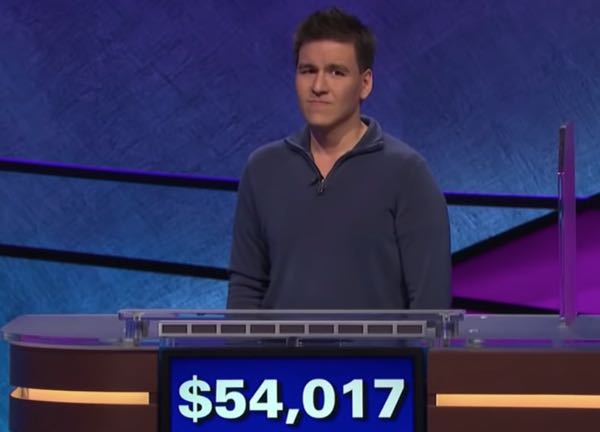
Jeopardy! fans have been awaiting Tuesday with bated breath ever since it was announced that the show would be airing a “Greatest Of All Time” tournament in primetime. The specials will pit the three most successful Jeopardy! contestants ever — James Holzhauer, Ken Jennings, and Brad Rutter — against each other in a tournament-style contest.
THE TOURNAMENT RULES
Each night’s show will be an hour, made up of two games of Jeopardy! Whoever totals the highest score in those two games wins that night’s match. Whichever contestant is the first to win three matches wins the tournament and $1 million grand prize.
The tournament should have plenty to offer for even casual Jeopardy! watchers. These are three of the finest Jeopardy! players alive facing off at the highest level, and it should make for several nights of intense and exciting television. The big question is: which of these competitors stands the best chance of winning the tournament?
Let’s take a closer look at all three before we pick a favorite.
THE CONTESTANTS
James Holzhauer
The most recent of the three competitors to appear on Jeopardy!, Holzhauer won $2,714,416 during play, plus another $250,000 for winning the most recent Tournament of Champions. Holzhauer became known for his high-risk style of bouncing around the board seeking Daily Doubles and betting huge sums on them when he found them. He attributed his willingness to do so to his background as a gambler, meaning he was perhaps less awed than his competitors by five-figure sums and an openness to bet them. While the strategy of bouncing around the board for Daily Doubles is hardly new, few have employed it as effectively as Holzhauer did. The game had simply never previously seen the combination of that level of betting combined with that amount of knowledge.
What makes him formidable may also be his undoing. Holzhauer nailed the vast majority of Daily Doubles while on the show, but one miss after betting big could be a setback from which he can’t recover. Holzhauer also benefited from his opponents’ lack of familiarity during his initial run: he’s very hard to beat if a contestant simply starts at the top of a category and goes down the board traditionally, which is how most prefer to play. Due to the way the show tapes, challengers were first exposed to Holzhauer on the day of their taping, and were simply caught flat-footed by his smarts, his ability to beat them on the signaling device and control the board, and his proficiency at racking up large leads before his fellow contestants had even been able to settle in.
Those advantages could be somewhat neutralized against seasoned players.
Jennings and Rutter know how Holzhauer plays. They won’t be unfamiliar with the signaling device. Plus, having both already won millions on the show, they’re less likely to be intimidated by the huge sums Holzhauer is willing to bet. Daily Doubles are the great equalizer in Jeopardy!, and if either Jennings or Rutter can beat Holzhauer on the signaling device with some regularity, gain control of the board, and find those Daily Doubles before he does, he could have an underwhelming showing. That said, in the Tournament of Champions, Holzhauer faced seasoned and successful contestants who knew his style of play, and he romped against everyone except Emma Boettcher, the contestant who beat him in the first place. Plus, he’s by far the most recent of the three to have played, which can only be beneficial.
Ken Jennings
Jeopardy’s original celebrity contestant, Jennings won 74 consecutive games in 2004 to become something of a national phenomenon. In total, he won $2,522,700 during his initial run and has added an extra $1 million through tournaments and exhibitions. There was no real secret or unique strategy to Jennings’ success: he was simply quick on the signaling device and seemed to know everything he was asked. In fact, you can thank him for the extra training contestants get on the signaling devices now; during his run, he realized his comfort with it gave him a huge advantage, and successfully lobbied the show to give would-be challengers more training on it before playing the game.
Jennings himself has been quite open about what he sees as two potentially problematic issues for him in a tournament: age and speed, or a lack thereof. Jennings is 45 now, and while that’s not particularly old, it’s still been 16 years since he participated on Jeopardy! He has said he does not expect to be quite as sharp anymore. The same principle applies regarding the signaling device. Whoever controls the Jeopardy! board has a major advantage, as they can pick the categories they’re most comfortable with and are the only ones with the ability to find those Daily Doubles. If Jennings has slowed down a bit, that could lead him to struggle.
There’s also the infamous stat that Jennings has never beaten Rutter. The two have faced off in the Ultimate Tournament of Champions, the Battle of the Decades, and the team-based All-Star Games. In all three tournaments, both contestants made the final, but Jennings came second to Rutter on all three occasions. The only time that didn’t happen was during the “IBM Challenge” games against Watson, an IBM computer; Jennings came second with Rutter third, but for record-keeping purposes, those games are considered an exhibition, not competitive play.
As formidable as Jennings is, he’s never actually won one of the tournaments he’s participated in since his initial run. That’s not true of Holzhauer and Rutter, and may be a hint about Jennings’ vulnerability against the best of the best.
Brad Rutter
Rutter is easily the least well-known of the three competitors, and that’s mostly down to circumstance. Rutter initially appeared on Jeopardy! in 2000, when a rule said five-day winners would automatically be retired to make way for a new set of contestants. Rutter won all five of his games, won $55,102, and stepped away undefeated.
That run was enough to be fondly remembered by Jeopardy! diehards, but there was no real way of knowing just how good a player he was until he was brought back for multiple tournaments. Rutter returned in 2001 and won that year’s Tournament of Champions to claim a $100,000 prize. In 2002, he beat 14 other champions in the Million Dollar Masters tournament to claim that prize. In 2005, he came from a field of 145 fellow winners to claim the Ultimate Tournament of Champions, which came with a $2.1 million payoff. He won another $1 million in the Battle of the Decades tournament in 2014, and also captained the winning team in 2019’s All-Star Games, splitting a $1 million prize with two teammates. In other words, in nearly two decades of playing, Rutter has the distinction of having never lost to a human; only IBM’s Watson has been able to best him, though he did finish in third behind Jennings in what was deemed an exhibition. His success on Jeopardy! also makes him the highest-earning American game show winner of all time.
Rutter may be the least known of the contestants, but he might be the most formidable.
Like Jennings, he’s never really been known to employ any unique off-the-wall strategies; he simply overwhelms opponents with superior speed and knowledge. Given he’s bested Jennings enough for his dominance to be fairly considered a trend and not a fluke, that strategy has worked before against the best of the best, and it may be enough to carry the day here. The risk Ruttger runs is probably that Holzhauer finds Daily Doubles, bets big, and gets them, but if Rutter can ring in quickly and control the board, he has a way to combat that threat.
PREDICTION
Predicting Jeopardy is hard; sometimes people have off-days, it’s hard to know who will dominate the signaling device, and the categories matter — Holzhauer would probably love a sports category, but has an infamous aversion to Shakespeare, for instance. It’s especially difficult due to the unfamiliarity of the opponents; while Rutter and Jennings are no strangers to each other, neither has faced Holzhauer, nor have they faced anyone quite like him.
You can also expect to see some adaptation in play style based on the format. With the totals of two games being added up for each win, betting strategy will be adjusted; Holzhauer did this during the Tournament of Champions, depriving us of some of his trademark “all-in” bets in the name of optimizing his chances of winning the full match. That, however, is mostly dependent on the positions each contestant is in at the time.
It’s very hard to bet against Rutter and his undefeated record. He’s been playing Jeopardy for roughly 20 years and doesn’t look to have lost much of a step in that time. Holzhauer will be made or broken by his ability to find and correctly answer Daily Doubles and control the board. If he can do that, he has a good chance. If Rutter or Jennings can nullify that advantage, he could very easily struggle. Jennings has always struggled in this format, and while anything’s possible, it doesn’t feel like this is the moment where he has his breakthrough against Rutter.
We’d put Rutter as a slight favorite, believing that he finds a way to control the board in enough games to neutralize Holzhauer’s strengths enough to win — just not in a sweep.













